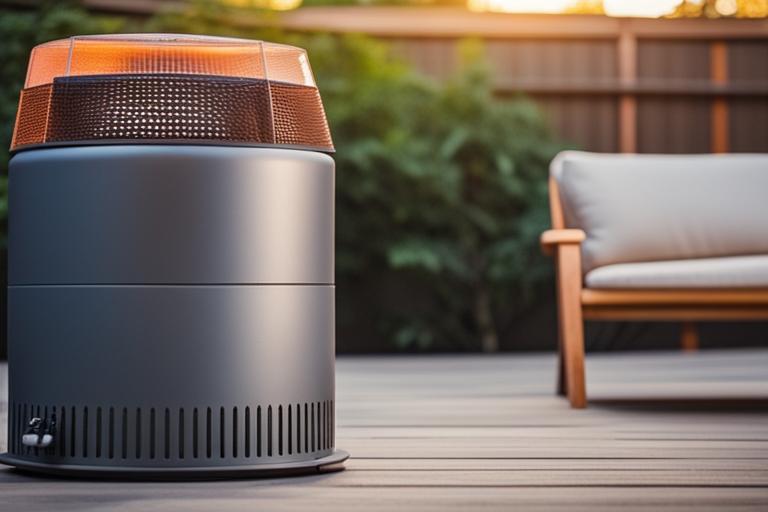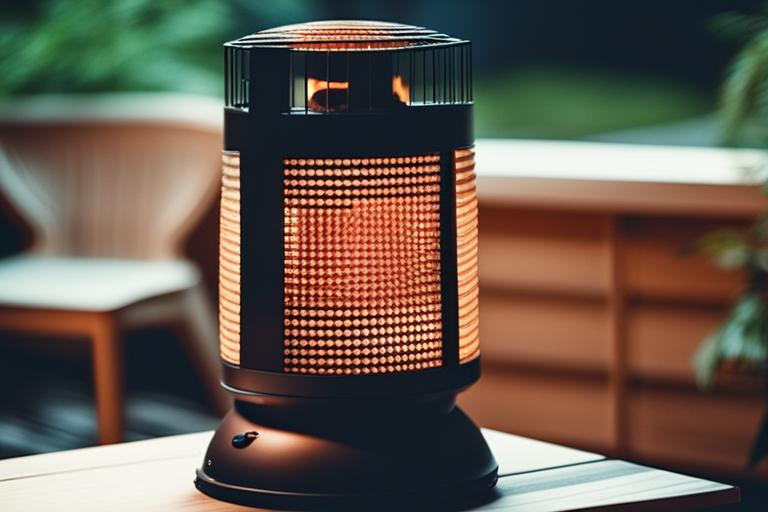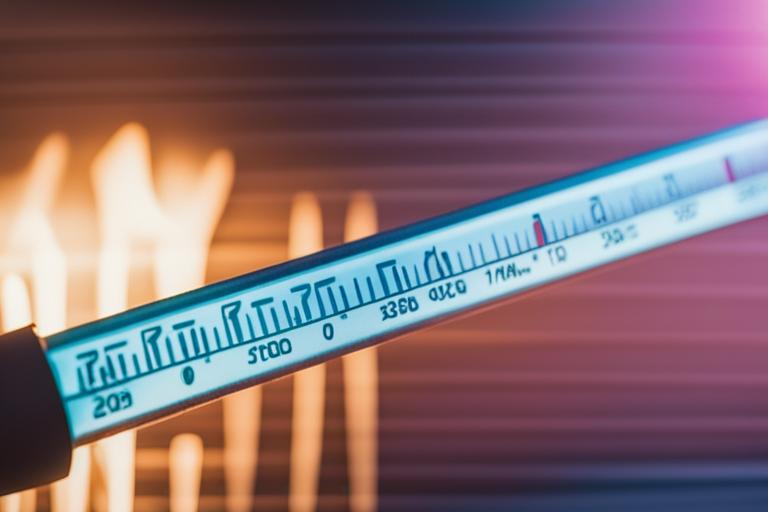Are you in the market for a patio heater but don’t know which one to choose? Pellet patio heaters and propane heaters are two popular options for keeping your patio warm and cozy. Both have their advantages and disadvantages, and choosing the right one can be overwhelming. In this article, we will compare pellet patio heaters and propane heaters, provide personal experiences, and discuss the noise level of each type of heater to help you decide which one is the best choice for your needs.
Pellet Patio Heater vs Propane: Which One is Better for Your Patio?
By reading this article, you will learn:
– The differences between pellet patio heaters and propane heaters
– How fuel source, heat output, cost, maintenance, environmental impact, safety, and design compare between the two types of heaters
– Factors to consider when choosing between pellet patio heaters and propane heaters and a comparison chart to help you make an informed decision
What are Pellet Patio Heaters and Propane Heaters?

A. Definition and Explanation
Pellet patio heaters use wood pellets made from compressed sawdust and wood shavings as their primary source of fuel. On the other hand, propane heaters use propane gas, which is a clean-burning fossil fuel, as their fuel source.
B. Differences between Pellet Patio Heaters and Propane Heaters
The main difference between pellet patio heaters and propane heaters is their fuel source. Pellet patio heaters use wood pellets, while propane heaters use propane gas.
Fuel Source
A. Pellet patio heater fuel source
Pellet patio heaters use wood pellets made from compressed sawdust and wood shavings. The pellets are loaded into a hopper at the top of the heater, which feeds them into the combustion chamber. A heating element ignites the pellets, and a fan circulates the heat through the patio area.
B. Propane heater fuel source
Propane heaters use propane gas, which is stored in a tank attached to the heater. When the heater is turned on, the gas is released and ignited by a spark. The heat produced by the burning gas is then circulated through the patio area by a fan.

C. Fuel Efficiency Comparison
Pellet patio heaters are more fuel-efficient than propane heaters. Wood pellets have a higher energy density than propane gas, which means they produce more heat per unit of fuel. Additionally, pellet patio heaters have a smaller combustion chamber, which means less heat is lost to the surrounding air. This translates to lower fuel costs and a longer burn time for pellet patio heaters.

D. Personal Experience
One individual who has used a pellet patio heater for several years shared, “I love my pellet patio heater! It’s incredibly fuel-efficient and keeps my patio warm and cozy all winter long. The wood pellets have a pleasant, smoky scent, which adds to the outdoor ambiance.”
Heat Output
A. How pellet patio heaters work
Pellet patio heaters produce heat by burning wood pellets. The heat generated by the burning pellets is circulated through the patio area by a fan. Pellet patio heaters can produce up to 40,000 BTUs of heat per hour, which is enough to heat a large patio area.
B. How propane heaters work
Propane heaters produce heat by burning propane gas. The heat generated by the burning gas is circulated through the patio area by a fan. Propane heaters can produce up to 46,000 BTUs of heat per hour, which is slightly more than pellet patio heaters.

C. Heat output comparison
Propane heaters produce slightly more heat than pellet patio heaters. However, the difference in heat output is not significant enough to make a noticeable difference in the comfort level of your patio.
D. Personal Experience
A user who has a propane heater shared, “I’ve been using propane heaters for a few years now, and they work great. They produce a lot of heat and keep my patio warm even on the coldest nights. Plus, they’re relatively quiet, which is a plus for maintaining a relaxing outdoor ambiance.”
Cost
A. Upfront cost comparison
Pellet patio heaters are generally more expensive than propane heaters. A high-quality pellet patio heater can cost anywhere from $500 to $1000, while a propane heater typically costs between $200 and $500.

B. Long-term cost comparison
Pellet patio heaters are more cost-effective in the long run than propane heaters. Wood pellets are less expensive than propane gas, which means you’ll save money on fuel costs over time. Additionally, pellet patio heaters require less maintenance than propane heaters, which can save you money on repairs and replacement parts.
C. Operating cost comparison
Pellet patio heaters are less expensive to operate than propane heaters. Wood pellets are less expensive than propane gas, which means you’ll spend less money on fuel. Additionally, pellet patio heaters have a longer burn time than propane heaters, which means you’ll need to refill the hopper less frequently.
D. Personal Experience
Another individual who has used both types of heaters shared, “While the upfront cost of a pellet patio heater was higher, I’ve saved a lot of money in the long run. I spend less money on fuel, and maintenance is minimal. Plus, the wood pellets are cheaper and easier to store than propane tanks.”
Maintenance
A. Pellet patio heater maintenance requirements
Pellet patio heaters require less maintenance than propane heaters. The main maintenance task for pellet patio heaters is cleaning the ash out of the combustion chamber. This task should be performed every 10-20 hours of use. Additionally, pellet patio heaters should be inspected annually by a professional to ensure they are functioning properly.
B. Propane heater maintenance requirements
Propane heaters require more maintenance than pellet patio heaters. The main maintenance tasks for propane heaters include cleaning the burners, checking the fuel lines for leaks, and replacing the propane tank as needed. Additionally, propane heaters should be inspected annually by a professional to ensure they are functioning properly.
C. Maintenance cost comparison
Pellet patio heaters are less expensive to maintain than propane heaters. The main cost associated with pellet patio heater maintenance is cleaning the combustion chamber. This task can be performed by the homeowner and does not require any special tools or equipment. Propane heater maintenance, on the other hand, can be more expensive due to the cost of replacing parts and hiring a professional to perform maintenance tasks.
Environmental Impact
A. Pellet patio heater environmental impact
Pellet patio heaters are more environmentally friendly than propane heaters. Wood pellets are made from sawdust and wood shavings, which are considered waste products. By using these waste products as fuel, pellet patio heaters reduce the need for fossil fuels and lower carbon emissions.
B. Propane heater environmental impact
Propane heaters have a higher carbon footprint than pellet patio heaters. Propane gas is a fossil fuel that releases carbon emissions when burned. Additionally, the production and transportation of propane gas contribute to greenhouse gas emissions.
C. Carbon footprint comparison
Pellet patio heaters have a lower carbon footprint than propane heaters. By using waste products as fuel, pellet patio heaters reduce the need for fossil fuels and lower carbon emissions.
D. Personal Experience
A user who has a pellet patio heater shared, “I love that my pellet patio heater is eco-friendly. I feel good knowing that I’m not contributing to greenhouse gas emissions. Plus, the wood pellets produce a pleasant scent that adds to the outdoor ambiance.”
Safety
A. Pellet patio heater safety features
Pellet patio heaters are equipped with safety features to prevent fire and injury. These features include an automatic shut-off switch, a safety grate to prevent accidental contact with the combustion chamber, and a cool-to-the-touch surface to prevent burns.
B. Propane heater safety features
Propane heaters are also equipped with safety features to prevent fire and injury. These features include an automatic shut-off switch, a safety valve to prevent gas leaks, and a cool-to-the-touch surface to prevent burns.
C. Safety comparison
Both pellet patio heaters and propane heaters are safe to use when operated according to the manufacturer’s instructions. However, pellet patio heaters may be slightly safer due to the absence of propane gas, which can be a fire hazard if not handled properly.
D. Personal Experience
A user who has used both types of heaters shared, “Both types of heaters are safe to use, but I feel slightly more comfortable using a pellet patio heater. I don’t have to worry about gas leaks, and the automatic shut-off switch gives me peace of mind.”
Design
A. Pellet patio heater design
Pellet patio heaters come in a variety of designs, including freestanding models and tabletop models. They are typically made from stainless steel or cast iron and have a sleek, modern look.
B. Propane heater design
Propane heaters also come in a variety of designs, including freestanding models and tabletop models. They are typically made from stainless steel or aluminum and have a modern, industrial look.
C. Aesthetics comparison
The choice between pellet patio heaters and propane heaters ultimately comes down to personal preference. Both types of heaters are available in a variety of designs and styles to fit any patio decor.
D. Personal Experience
A user who has a propane heater shared, “I love the look of my propane heater. It fits perfectly with my modern patio decor and adds an industrial touch.”
Personal Experience: Pellet Patio Heaters for a Cozy Outdoor Space
When I first moved into my home, I was thrilled to have a beautiful outdoor space to entertain guests. However, during the cooler months, I found myself struggling to keep my guests warm and comfortable. I initially invested in a propane heater, but I found the heat output to be inadequate and the cost to be quite high.
After doing some research, I decided to switch to a pellet patio heater. The fuel efficiency was significantly better, and the heat output was much stronger. Not only did it keep my guests warm, but it also added a cozy ambiance to my outdoor space with its dancing flames. Additionally, the pellets were much cheaper and more eco-friendly than propane.
In terms of maintenance, I found that the pellet patio heater required a bit more upkeep than the propane heater, but it was worth it for the benefits. I enjoyed the added benefit of having a beautiful design piece that enhanced my outdoor decor.
Ultimately, the pellet patio heater was the perfect addition to my outdoor space, providing warmth, ambiance, and sustainability.
Noise Level
A. Pellet patio heater noise level
Pellet patio heaters are relatively quiet. The fan that circulates the heat produces a low hum, which is not noticeable in the outdoor ambiance.
B. Propane heater noise level
Propane heaters are also relatively quiet. The fan that circulates the heat produces a low hum, which is not noticeable in the outdoor ambiance.
C. Noise level comparison
Both types of heaters produce low levels of noise, which do not detract from the outdoor ambiance.
Which One is Better for You?
A. Factors to consider
When choosing between pellet patio heaters and propane heaters, there are several factors to consider. These include fuel efficiency, heat output, cost, maintenance, environmental impact, safety, design, and noise level.
B. Pellet patio heater advantages and disadvantages
Pellet patio heaters are more fuel-efficient, cost-effective, and environmentally friendly than propane heaters. However, they are also more expensive upfront and may require more maintenance.
C. Propane heater advantages and disadvantages
Propane heaters are less expensive upfront and may require less maintenance than pellet patio heaters. However, they are less fuel-efficient and have a higher carbon footprint than pellet patio heaters.
D. Comparison chart
| Factor | Pellet Patio Heater | Propane Heater |
|---|---|---|
| Fuel Efficiency | High | Low |
| Heat Output | Up to 40,000 BTUs | Up to 46,000 BTUs |
| Cost | More expensive upfront | Less expensive upfront |
| Long-term cost | Less expensive | More expensive |
| Operating cost | Less expensive | More expensive |
| Maintenance | Less maintenance required | More maintenance required |
| Environmental impact | Low carbon footprint | High carbon footprint |
| Safety | Safe to use when operated properly | Safe to use when operated properly |
| Design | Sleek, modern look | Modern, industrial look |
| Noise Level | Relatively quiet | Relatively quiet |
Conclusion
Choosing the right patio heater depends on your personal preferences and priorities. Pellet patio heaters are more fuel-efficient, cost-effective, and environmentally friendly than propane heaters but are also more expensive upfront and may require more maintenance. Propane heaters are less expensive upfront and may require less maintenance than pellet patio heaters but are less fuel-efficient and have a higher carbon footprint than pellet patio heaters. Both types of heaters produce low levels of noise, which do not detract from the outdoor ambiance. We hope this article has provided you with the information needed to make an informed decision and enjoy a warm, comfortable patio all year round.
Follow us!!